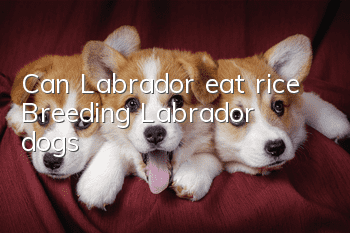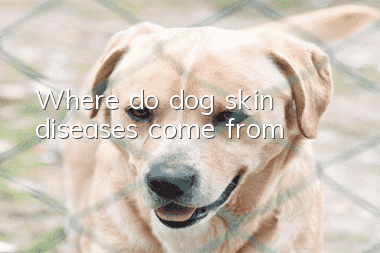What can’t dogs eat? Ten foods that dogs should avoid!

When we are eating, dogs will look at the food in our mouths and hands with full attention. Their eyes are always full of hunger and thirst. The owner who sees this will be reluctant to secretly stuff one or two. He gave the dog a piece of food, and when he saw the dog's happy and satisfied look, he couldn't stop giving it more food.
However, the physiological structure and metabolism of humans and dogs are different, and the relative nutritional needs are also different. Therefore, some foods can be fatal to dogs, so dogs’ "eating" cannot be ignored!
First of all, let me explain that the following is not a phenomenon that will occur every time in every dog, but is a relatively common clinical case. Due to breed and individual differences, the performance of each dog may be different, or even non-existent.
Ten foods that dogs should avoid:
1. Chocolate
Theobromine in chocolate reduces blood flow to the brain in animals, which may cause heart disease and other potentially fatal problems. The higher the purity of chocolate, the higher the theobromine content it contains, and the more harmful it is to dogs.
2. Onions and green onions
Raw or cooked onions and scallions also contain disulfide, which is harmless to the human body, but can destroy the red blood cells of cats, dogs, sheep, horses, and cattle, and may cause hemolytic anemia.
3. Liver
Liver is a dog’s favorite delicacy, but excess may cause problems. Because the liver also contains a large amount of vitamin A, it can cause vitamin A poisoning, making the dog unable to absorb calcium in food normally and leading to rickets. Feeding should not exceed three chicken livers (or equivalent amounts of other animal livers) per week.
4. Bones
Chicken bones and other poultry bones are very sharp and can penetrate the dog's throat or cut the dog's mouth, esophagus, stomach or intestines. You can feed large bones of pigs or cows, but they must be boiled in a pressure cooker. Bone marrow is an excellent source of calcium, phosphorus, and copper. Chewing large bones can help remove tartar.
5. Raw eggs
Raw egg whites also have a protein called avidin, which will deplete the vitamin H in your dog’s body. Vitamin H is an essential nutrient for dog growth and coat health, and raw eggs often contain germs. Hard-boiled eggs provide high-quality protein.
6. Raw meat
The dog’s immune system is no longer able to adapt to Salmonella, the most common food in artificially raised poultry and livestock meat.Bacillus and Bacillus, parasites that may be present in raw meat are also very dangerous. If you are feeding meat, cook it at least medium-rare.
7. Milk
There is also a large amount of lactose in milk, and dogs’ intestines and stomach cannot absorb lactose well. Dogs may develop gas, diarrhea, dehydration or skin inflammation after drinking milk. We can buy milk specially developed for pets, which will be beneficial to their gastrointestinal tract.
8. High-fiber foods
Seafood, meat, and high-fiber foods such as bamboo shoots and beans can easily cause indigestion in dogs.
9. High-sugar foods
A craving for sweets is probably a common problem among dogs and people, but sweets such as snacks and sugar can easily lead to obesity, and can also easily lead to insufficient calcium absorption and dental caries, which is not good for dogs at all. Pet-specific treats or sugar-free cakes are available for purchase.
10. High-salt foods and spices
Dog food usually contains an appropriate amount of inorganic salt and does not require additional supplements. The food people eat contains too much salt for dogs. Spices will increase the burden on the kidneys and liver, and will slow down the dog's sense of smell.
You know what things dogs cannot eat, right? Parents should not give their dogs things they shouldn’t eat out of temporary pampering, otherwise they will regret it!
- What happens if an Alaskan dog can’t walk?
- How to train a female Staffordshire Terrier? How to make a female Staffordshire Terrier obedient?
- Can pet dogs not be vaccinated?
- What are the symptoms of excessive calcium supplementation in golden retrievers?
- Why do dogs love to eat paper? Why do dogs love to eat paper?
- How to feed and care for Chihuahuas in summer?
- Dog vomiting and diarrhea
- Do dogs need shoes?
- How to deal with skin diseases in French cattle dogs
- Will an adopted pug recognize its new owner?



